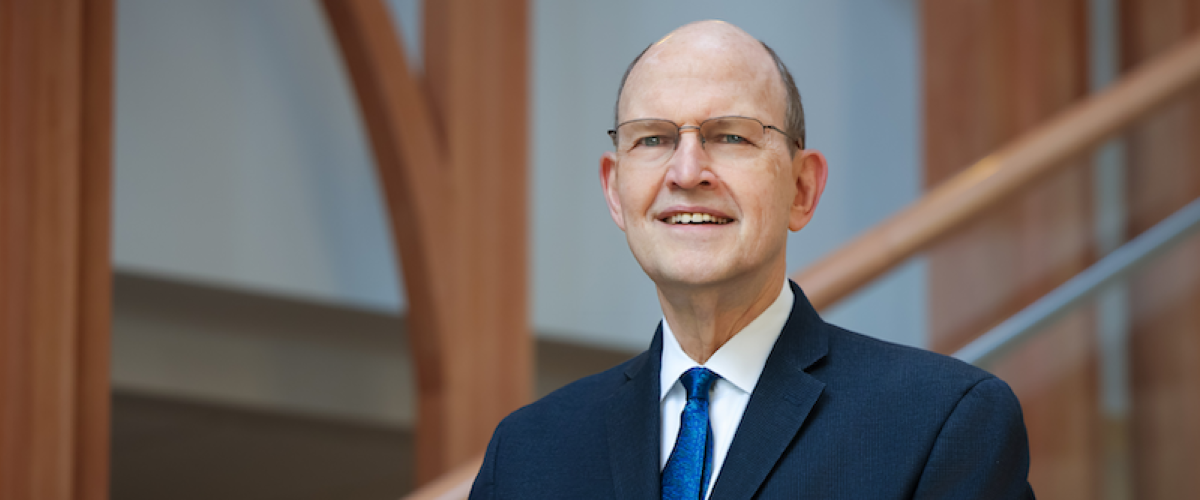
Since 2004, Christopher Willett, MD, has served as chair of the Department of Radiation Oncology; under his leadership, the Department has grown and thrived across all missions and has been recognized as a globally preeminent academic leader.
He is a graduate of Tufts University (BS, 1977) and Tufts University School of Medicine (MD, 1981). At the beginning of his career, during a residency at Massachusetts General Hospital, Dr. Willett wrote a series of seminal articles on radiation therapy for colon cancer. He continued to significantly impact the academic field, including authoring more than 400 scientific papers and reviews. He has also been involved in developing clinical protocols for both gastrointestinal cancer and intraoperative radiation therapy – two areas in which he is recognized as an international expert.
In addition to research and patient care, Dr. Willett has demonstrated a tremendous commitment to teaching, training and mentoring the next generation of radiation oncologists. In 2002, he received the Teacher of the Year Award from the Association of Residents in Radiation Oncology. In 2005, he received the Radiation Oncology Teaching Award at Duke. He has served as a mentor and reference for many trainees and has had a lasting impact on the field.
Dr. Willett is active in professional societies, including the American Society for Radiation Oncology (ASTRO), and his commitment has been recognized with honors including ASTRO’s Gold Medal Award (2016); he has also been named a Fellow of ASTRO (2011).
Dr. Willett will continue to serve as the Mark W. Dewhirst Distinguished Professor of Radiation Oncology.

"Dr. Willett’s contributions to patient care, research and education have greatly impacted countless lives. Having worked closely with him over the years, I have always been impressed by his thoughtful leadership through times of change and challenge, and his unwavering commitment to clinical excellence and a culture of safety and quality. He will leave a lasting legacy at Duke.”
— Tom Owens, MD, Executive Vice President and Chief Operating Officer, Duke University Health System

"Under Dr. Willett’s visionary leadership for the past two decades, the department has grown in both size and impact, and has advanced in every mission from patient care to groundbreaking research. His dedication to mentorship has transformed the careers of many trainees, and his contributions to the field, particularly in gastrointestinal cancers, have been truly pioneering.”
— Mary Klotman, MD, Executive Vice President for Health Affairs, Duke University; Dean, Duke University School of Medicine; and Chief Academic Officer, Duke Health

"I knew very early in my residency at Duke that treating GI cancers was my calling. Dr. Willett recognized and fostered this passion as a trainee, provided guided mentorship throughout my early academic years, and subsequent sponsorship throughout my career. Any success I have achieved in academic medicine is, in large part, due to his investment in me.”
— Manisha Palta, MD, Associate Professor of Radiation Oncology and residency class of 2012

"Dr. Willett has built one of the premier Departments of Radiation Oncology in the nation, and even the world. His patient-focused approach has resulted in significant clinical growth that has met both patient and provider needs.”
— Peter Allen, MD, Duke University Health System Vice President for Cancer Services

"I would best describe Chris using the words that Sir William Olsen coined to describe the best physicians ... imperturbability and equanimity. What that means is that Chris is calm and measured in the face of adversity, and he is resilient. We will continue to benefit from his ‘Osler like’ wisdom as he returns to the bedside. Bravo!”
— Richard Shannon, MD, Senior Vice President and Chief Medical Officer, DUHS and Chief Quality Officer, Duke Health

"Dr. Willett first came to Duke as chairman in 2003, at the same time that I joined the faculty after completing my residency at Duke in June 2023. That kind of change always involves some anxiety, but Dr. Willett was an excellent leader and mentor from the very beginning. He made sure that I had adequate protected time for academic work, and always provided support and encouragement.
It was clear from the start that he had a powerful and optimistic vision for the department’s future and that he possessed the leadership skills to make it happen. Dr. Willett quickly learned the name of every single person working in the Department, including all the house staff, the radiation therapists, the nursing staff and the clerical support. It was an impressive accomplishment in a department as large as ours, and it boosted morale and help to accurately set the stage for things to come, because he was to establish himself as a leader who improved the status of the Department as a whole by providing the best opportunity for each individual member.
For variety of reasons I left the department for 12 years to pursue a career in private practice. There was much that was good about this and in retrospect it may or may not have been the right move, but there was certainly much about the Department that I missed, including the camaraderie, the opportunity to teach and the intellectual environment. After some tumultuous times in my organization, Dr. Willett reached out to me and recruited me back to Duke to take a job at one of our affiliate facilities in Danville, Virginia. I was so grateful for this opportunity, and while there were a number of factors that contributed to my decision to take the job, one of the most important was the desire to work for a leader whom I could truly trust. Dr. Willett made multiple promises and kept them all. I had proposed a somewhat unusual academic career, one without an established track or a clear path forward; he made the effort to search out a way that I could achieve it and then consistently gave me the time and the support to make it happen. There were multiple times when I had classes to teach on campus at Duke, and the planned coverage in my Danville clinic fell through, and Dr. Willett came himself to cover the clinic. He not only protected my time, but he often did it by sacrificing his own; not every chairman would make that choice. Because of his encouragement, I have been able to develop an academic career that I find very satisfying, I think brings some benefit to others, and it could never have happened without his emotional, intellectual, and temporal support.
The greatest benefit of working with Dr. Willett is the joy of knowing that the person who is my boss should be my boss. Like many physicians, I have an independent streak and perhaps some pridefulness (on rare occasions!). I don’t take easily to authority. But under Dr. Willett’s leadership this has never been a problem. I have never had to question his motives; I have never had to question his judgment; I have never had to question his ethics; I have never had to question his care for his faculty or for our patients. Even as we have had to negotiate some stressful circumstances during recent years, I have always been confident that he cared deeply about each of our interests, would make the decisions that he felt would be best for the department, and that his judgment would always be wise. It is a rare opportunity to work under that kind of leadership, and I am very grateful to have had the chance."
— Brian Quaranta, MD, MA, Associate Professor of Radiation Oncology and residency class of 2003